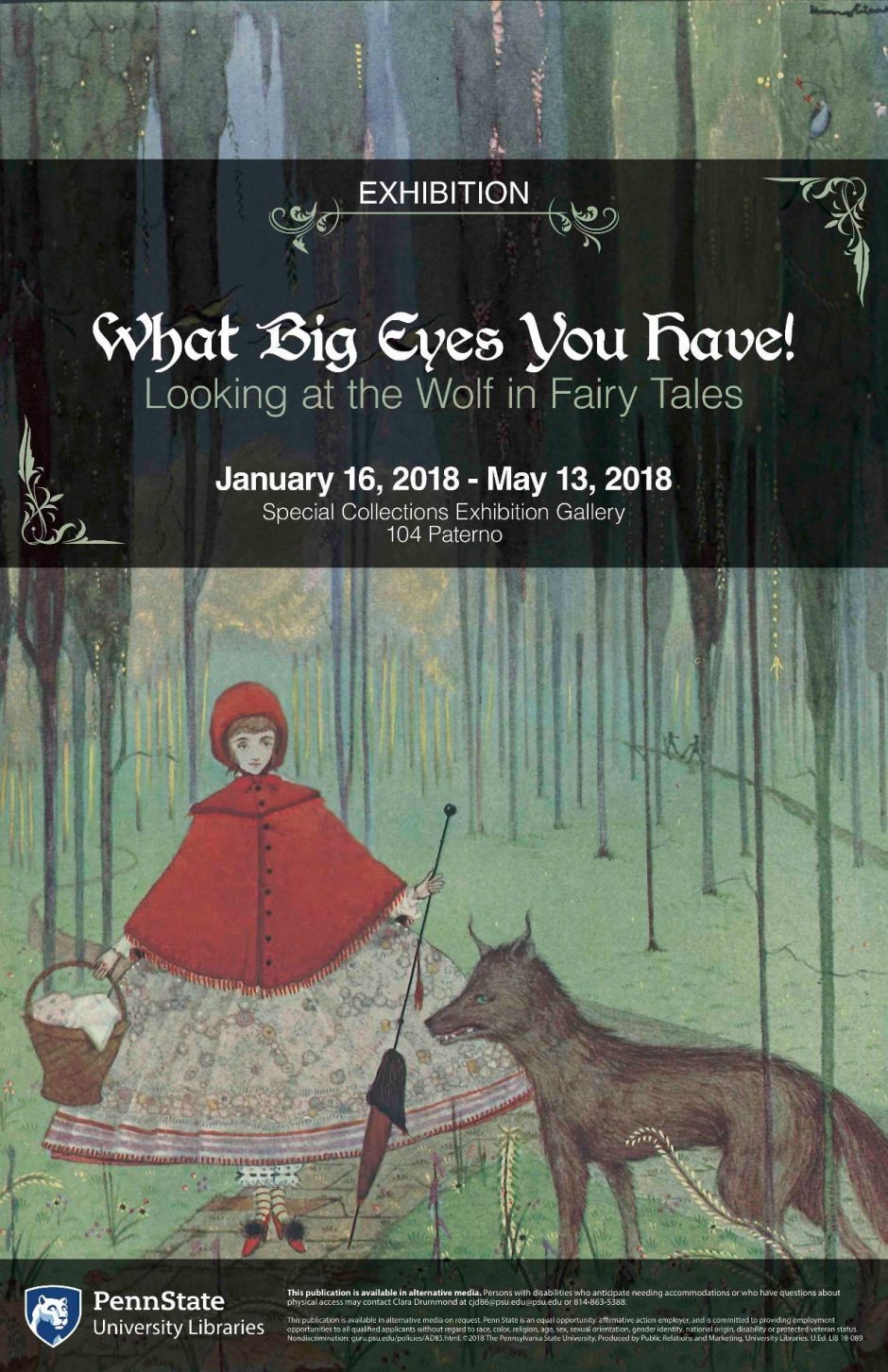Fall 2018
Academic calendar information for all campuses is available online.
 Jan. 16–Aug. 26, “What Big Eyes You Have! Looking at the Wolf in Fairy Tales”exhibition, Eberly Family Special Collections Library Exhibition Room, 104 Paterno Library.
Jan. 16–Aug. 26, “What Big Eyes You Have! Looking at the Wolf in Fairy Tales”exhibition, Eberly Family Special Collections Library Exhibition Room, 104 Paterno Library.
Feb. 18-Aug. 13, “Depth of Field” exhibit, Diversity Studies Room, 203 Pattee Library, seeks to highlight the intersections of war in the Middle East with the history of war photograph
Monday, August 20: First day of fall 2018 classes.
Wednesday, Sept. 26: Geospatial Exploration: Mapping and location topics and applications. An overview of geographic information systems (GIS) concepts relevant to applying geospatial components in projects., providing an introduction to geospatial data, introductory topics of projects, data manipulation, and geoprocessing techniques. Examples of resources and data for this session are on the Maps and Geospatial: Geographic Information Systems (GIS) guide.3-4 p.m., 13 Pattee Library, University Park.
Wednesday, Sept. 26: Geospatial Data: Library Resources and beyond. Geospatial data available from library databases, PolicyMap, SimplyAnalytics, Social Explorer, and Data-Planet. Additional United States and international organizations will be highlighted from maps and geospatial guides, and related resources to guide the user in locating geospatial data relevant to multiple disciplines. Examples of resources and data for this session are on the Maps and Geospatial: Geographic Information Systems (GIS) guide, section on library databases. 4-5 p.m., 13 Pattee Library, University Park.
Wednesday, Oct. 3: Geospatial Online: Overview of ArcGIS Online. An introduction to ArcGIS Online, a web mapping application which can be used to communicate many spatial research interests across the disciplines. Participants will explore applications created with ArcGIS Online and work with a sample dataset for Centre County, PA to learn the functionality of ArcGIS Online web maps and applications. More information on ArcGIS Online is available on the Maps and Geospatial: ArcGIS Online guide. 3-4 p.m., 13 Pattee Library, University Park.
Wednesday, Oct. 3: Geospatial Analysis: New to ArcGIS Pro. Learn the uses of ArcGIS Pro software, key terminology of ArcGIS Pro and examples of the functionality within the ArcGIS Pro software. Maps and geospatial examples will be provided in an interdisciplinary manner for participants. More information on ArcGIS Pro is available on the Maps and Geospatial: ArcGIS Pro guide. 4-5 p.m., 13 Pattee Library, University Park.
Wednesday, Oct. 10: Geospatial Analysis: Using ArcGIS Desktop for location and demographic data. An introduction to using ArcMap software to work with location data and demographic data and working with sample data. Participants are encouraged to consider and/or use their own data based on research, work, and/or teaching interests. This session will demonstrate general processes of working with location-based data, which may require additional instruction and follow-up in specific contexts, geographic regions, and disciplines. Examples of resources and data for this session are on the Maps and Geospatial: Geographic Information Systems (GIS) guide. 3-4 p.m., 211A Pattee Library, University Park.
Wednesday, Oct. 10: Open Source GIS: QGIS. An introduction to using QGIS, an open source GIS software option. Learn more about QGIS from the QGIS website. Participants are encouraged to bring their laptop and if desired have QGIS installed to experience first-hand some of the software’s options for working with geospatial data. More information on QGIS is located on the Maps and Geospatial: Open Source GIS guide, QGIS section. 4-5 p.m., 211A Pattee Library, University Park.
Tuesday, Nov. 13: Penn State GIS Day. A one-day seminar for individuals working with GIS, geospatial technologies, remote sensing, maps, and location-based research on campus to foster greater geospatial awareness on campus, within the community, and beyond. 11 a.m.-5 p.m., Foster Auditorium, Paterno Library and Franklin Atrium, Pattee Library, University Park campus.




